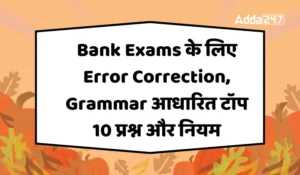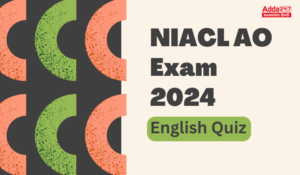English Quiz For IBPS PO & Clerk 2019
Directions (1-5): Rearrange the following five sentences (A), (B), (C), (D) and (E) in the proper sequence to form a meaningful paragraph and then answer the questions given below.
(A) the increase in the taxable income limit for rebate from Rs. 3.50 lakh to Rs. 5 lakh effectively means that many taxpayers with gross incomes of even a little over Rs. 8.35 lakh may not have to pay any tax at all, given the deductions for tax savings investments of Rs. 1.5 lakh, the additional deduction of Rs. 50,000 for National Pension System,
(B) this year’s Budget, which was largely expected to be a vote on account, without any changes in the tax law, surprised taxpayers by containing eight amendments, all of which are beneficial to taxpayers.
(C) besides, taxpayers with taxable income in excess of Rs. 5 lakh would not benefit in any manner by the change in this rebate, and would continue to pay the tax as before.
(D) the additional pleasant surprise was that, other than these eight proposals, all mentioned by finance minister Piyush Goyal in his Budget speech, there were no lurking surprises in the fine print of the law proposing the changes.
(E) Rs. 75,000 for mediclaim premium, Rs. 10,000 for bank interest, and standard deduction of Rs. 50,000 for salaried employees. However, though no tax may be payable by such taxpayers, if their income is more than Rs. 2.5 lakh, they would still have to file a return of income.
Q1. Which of the following will be the FIFTH sentence after the rearrangement?
(a) A
(b) B
(c) C
(d) D
(e) E
Q2. Which of the following will be the SECOND sentence after the rearrangement?
(a) A
(b) B
(c) C
(d) D
(e) E
Q3. Which of the following will be the FIRST sentence after the rearrangement?
(a) A
(b) B
(c) C
(d) D
(e) E
Q4. Which of the following will be the FOURTH sentence after the rearrangement?
(a) A
(b) B
(c) C
(d) D
(e) E
Q5. Which of the following will be the THIRD sentence after the rearrangement?
(a) A
(b) B
(c) C
(d) D
(e) E
Directions (6-10): Rearrange the following five sentences (A), (B), (C), (D) and (E) in the proper sequence to form a meaningful paragraph and then answer the questions given below.
(A) Under the scheme, Rs. 6,000 per year will be provided to farmers holding cultivable land of up to two hectares. This has been done because the government is aware that the smaller the land holding, the greater the need for financial support.
(B) The States have to upload the data of the beneficiaries on the portal. The Ministry of Agriculture and Farmers’ Welfare will transfer the benefit directly into the accounts of the beneficiaries.
(C) The Pradhan Mantri Kisan Samman Nidhi (PM-KISAN) scheme, announced in the Interim Budget, is the biggest scheme launched by the Government of India till date for providing structured support to small and marginal farmers.
(D) This is a Central Sector Scheme and will be funded fully by the Government of India. The guidelines of the scheme have been issued. The government has developed a portal for managing the scheme which has gone live.
(E) The amount will be credited into the account of the beneficiary within 48 hours of its release by the government.
Q6. Which of the following will be the FIFTH sentence after the rearrangement?
(a) A
(b) B
(c) C
(d) D
(e) E
Q7. Which of the following will be the SECOND sentence after the rearrangement?
(a) A
(b) B
(c) C
(d) D
(e) E
Q8. Which of the following will be the FIRST sentence after the rearrangement?
(a) A
(b) B
(c) C
(d) D
(e) E
Q9. Which of the following will be the FOURTH sentence after the rearrangement?
(a) A
(b) B
(c) C
(d) D
(e) E
Q10. Which of the following will be the THIRD sentence after the rearrangement?
(a) A
(b) B
(c) C
(d) D
(e) E
Directions (11-15): Rearrange the following five sentences (A), (B), (C), (D) and (E) in the proper sequence to form a meaningful paragraph and then answer the questions given below.
(A) Without productive and dependable employment for the vast majority of a country’s workforce, economic growth either remains elusive, or its benefits end up concentrated among a tiny minority.
(B) It is typically a stable formal-sector position that comes with core labour protections such as safe working conditions, collective bargaining rights, and regulations against arbitrary dismissal.
(C) The scarcity of good jobs also undermines trust in political elites, adding fuel to the authoritarian, nativist backlash affecting many countries today.
(D) Around the world today, the central challenge for achieving inclusive economic prosperity is the creation of sufficient numbers of “good jobs”.
(E) The definition of a good job obviously depends on a country’s level of economic development.
Q11. Which of the following will be the FIFTH sentence after the rearrangement?
(a) A
(b) B
(c) C
(d) D
(e) E
Q12. Which of the following will be the SECOND sentence after the rearrangement?
(a) A
(b) B
(c) C
(d) D
(e) E
Q13. Which of the following will be the FIRST sentence after the rearrangement?
(a) A
(b) B
(c) C
(d) D
(e) E
Q14. Which of the following will be the FOURTH sentence after the rearrangement?
(a) A
(b) B
(c) C
(d) D
(e) E
Q15. Which of the following will be the THIRD sentence after the rearrangement?
(a) A
(b) B
(c) C
(d) D
(e) E
- Tips and Tricks To Solve Cloze Test Questions For Bank and Other Competitive Exams
- Reading Comprehension Tips For SBI Clerk Exam 2018
- Conjunctions: English Language Notes for Bank and Other Competitive Exams





 Practice for English Section: 15 Cloze T...
Practice for English Section: 15 Cloze T...
 Bank Exams के लिए Error Correction, Gram...
Bank Exams के लिए Error Correction, Gram...
 English Quiz For NIACL AO Mains 2024 Exa...
English Quiz For NIACL AO Mains 2024 Exa...










